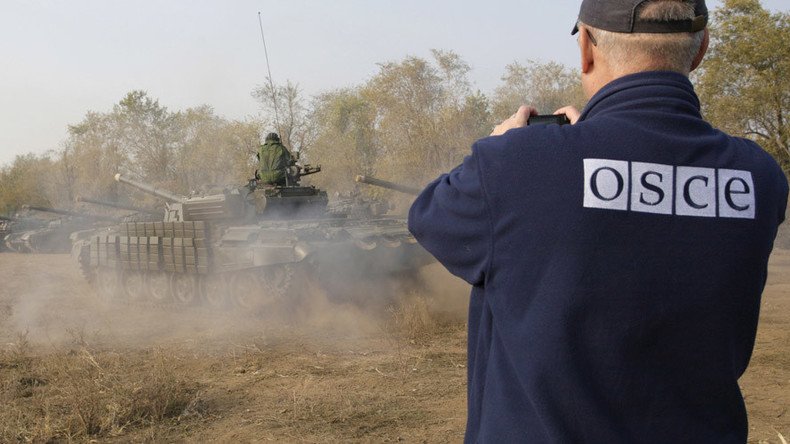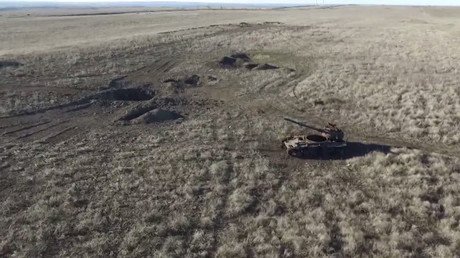East Ukraine rebels oppose presence of armed OSCE police, ‘would consider it intervention’

The self-proclaimed Donetsk and Lugansk People’s Republics (DPR and LPR) are strongly against the idea of deploying an armed police OSCE mission in Donbass, eastern Ukraine, according to DPR envoy to the Minsk Contact Group Denis Pushilin.
Donetsk News Agency quoted Pushilin as saying that just as before, Donbass is expressly against any armed missions on the territory of the Lugansk and Donetsk People’s Republics and would consider such a move an intervention.
Earlier, commenting on Monday’s telephone conversation between the leaders of the Normandy Four countries (Germany, France, Russia and Ukraine), the press service of the Ukrainian president said that negotiators “expressed support for the deployment of the OSCE (Organization for Security and Cooperation in Europe) police mission in Donbass and the launch of consultations on this issue.”
Kremlin spokesman Dmitry Peskov later clarified that the leaders of Normandy Four have been discussing the deployment of a monitoring OSCE mission on the contact line - the line that lies between the rebel forces and Ukrainian armed forces, adding that such a mission may be deployed only upon agreement from representatives of the self-proclaimed Donetsk and Lugansk republics.
“[The discussion concerns] a monitoring mission in Donbass, in our understanding this is not a police mission," Peskov said as cited by TASS. “In theory, it can be armed,” he said, adding that as the members of the mission are not servicemen, the issue is "how they will use these armaments.”
Peskov added that many other issues in this context arise and therefore the discussion will continue.
Denis Pushilin also stressed that the presence of armed OSCE representatives at the upcoming local election is also out of the question, adding that the DPR Interior Ministry is able to ensure the safety of the elections on its own.
“I am sure that the fact that OSCE’s monitoring mission has not suffered any losses during this conflict can only be attributed to OSCE representatives being unarmed,” Pushilin stressed.
According to him, Kiev is apt to distort information on the issue of deploying an armed police OSCE mission to Donbass.
“Ukraine tends to distort the real situation. It distorts reality before the Normandy Four talks, during and after them,” Pushilin said. “Ukraine makes it look like this issue [armed police OSCE mission] has been agreed upon. No, it has been agreed to discuss it in Minsk.”
The group of four countries – dubbed 'Normandy Four' after their leaders met during WWII Normandy landings' anniversary celebrations in northern France – has been holding regular meetings on the Ukraine conflict since June 2014.
Authorities of the Lugansk People’s Republic also stated their dissatisfaction with the potential deployment of an armed police mission in the region.
“We unalterably oppose [such a deployment], such a mission is not provided for by the Minsk agreement and would only blight the peace process, while local residents would regard it as an intervention, and it can provoke a corresponding response,” Interfax quoted a representative of the self-proclaimed LPR authorities as saying.
Kiev launched a military operation against the country’s Donetsk and Lugansk regions in April 2014. The coup in Kiev two months earlier brought to power a western-leaning government containing many open nationalists which caused discontent and resistance in the southeastern parts of the country, populated with ethnic Russians and Russian-speakers. Kiev’s attempts to quench the dissent with military force resulted in a full-scale military conflict and an attempted breaking away of the two self-proclaimed republics in Lugansk and Donetsk.
The Minsk agreement of February 2015 on the Ukrainian conflict stipulated a full ceasefire, a weapons withdrawal from the line of contact in eastern Ukraine and an all-for-all prisoner exchange – leading to local elections and constitutional reforms, which would give a special status to Donetsk and Lugansk regions.
According to the latest UN figures, more than 9 thousand have been victimized by the conflict.














